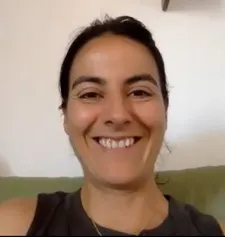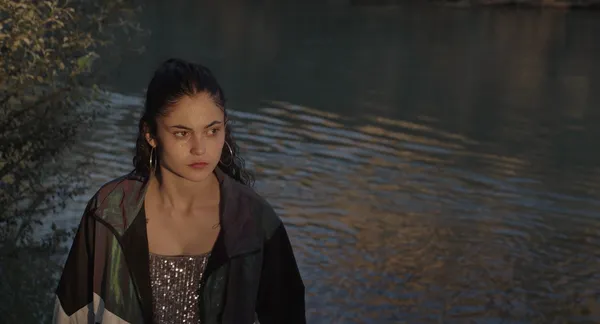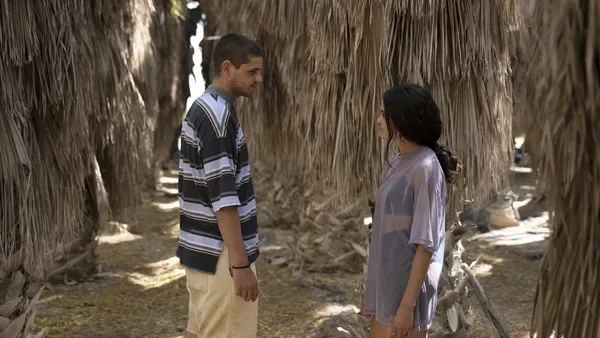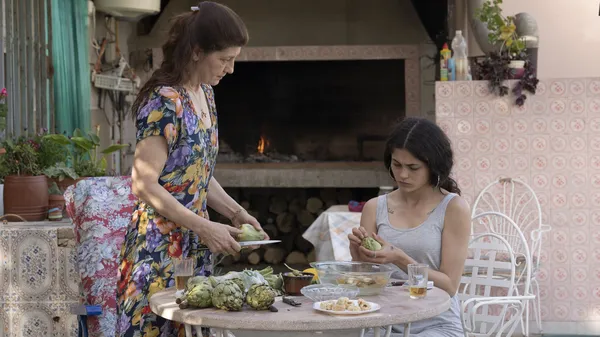Elena López Riera's debut feature The Water (El Agua) is a coming-of-age tale infused with myths from the writer/director's home region of Orihuela in the south-east of Spain. It stars newcomers Luna Pamiés and Alberto Olmo as Ana and José, teenagers embarking on first love in the heat of summer. With the weather threatening to break, a local myth about the river bursting its banks in devastating floods that carry off women the river has fallen in love with also hangs thick in the air. In a break from traditional narrative, the director includes documentary elements where women from the area tell the story of the myth in their own words.
When I caught up with López Riera shortly after her film premiered at Cannes Film Festival in its Director's Fortnight sidebar, I asked her about the myth and its connection to the place in a conversation that also encompassed gender roles and the approach of American philosopher and gender theorist Judy Butler.
She said: “I was born there. I was raised there by most of the woman that actually are doing this bit [the documentary element] during the film. So one of them is my mum. So I'm really very close to this mythology, then I worked on it a little bit for the film, because what, I was really interested the most in was this oral tradition. Each one has his or her own version. And, for me, it's like the version my grandma told me, but maybe there are a lot of people from the same town who don't know these versions of the story. For me, what is very interesting about legend, its that each one could like reappropriate this storytelling to project their own fears, their own desires and their own mythology as well.”
Although the oral traditional of the flooding and river myth forms the backdrop of the film, it’s also about the smaller myths that people create for themselves, such as the tales José tells of travelling, which may or may not be true.
 |
| Elena López Riera: 'I strongly believe that storytelling and auto-mythology and intimate mythology, is something that is absolutely necessary for us as humans' |
“This is something very interesting for me because I strongly believe that storytelling and auto-mythology and intimate mythology, is something that is absolutely necessary for us as humans. In every culture, in every place in the world, people need to find some other dimension, some fictional dimension, some magical dimension, then you have different intensity this magic of this dimension. But I think that fiction is something we every everyone needs."
She adds: “My own theory is that everyday life is super hard. We need we need some fiction. From the origin of history, every culture needs some fiction, storytelling is the base of human culture. So I was interested in taking this very particular mythology to work on the idea of how we create storytelling and how we transform it. Something that disturbs me a little bit like, in my political opinion, is that most of the world thinks that in a rural region, people are in living another time, like where nothing happens and where all culture and mythology are fixed in time. I think in big cities, there are also mythologies. I mean, let's look around and see how people are crazy about astrology right now or political mythologies. I’m interested especially in the mechanism, not in that mythology, in particular.”
Although the myth is all about something being done to a woman, a way, presumably, of dealing with tragedy that was wreaked by actual floods, Ana picks it up and runs with it herself, as she wants the myth, in some ways, to do something for her.
The director says: "This is my intimate way of seeing the history of feminism about how it is changing nowadays. For me, something that is hard sometimes is to confront the previous generation of women’s way of thinking or way of living or way of educating. I think about my mom, my grandma and how angry I was sometimes with them, because they were the ones who told me not to lie down with boys, not to do that, not to do this and to be afraid of streets at night. But at the same time I tried to understand how hard it was for them.
“For me, the way the main character tries to also transform these mythologies into her interest was the main point of the film. I also tried to see these women as a movement or resistance also. They try to do the best they could in the kitchen and in these intimate places.”
López Riera says this is why the dynamic between Ana, her mother Isabella (Bárbara Lennie) and her grandmother (Nieve de Medina) is crucial to the film.
Speaking about the older women, she says: “They never get out of the house and they try to also transform this marginalisation from the rest of the town into a way of resistance. It’s like, ‘Okay, you all don't want to see as us as a person so don't worry, we are building a castle here and we are going to have fun here. We are going to love we are going to decide, were going to speak about sex and alcohol. For me, it's like trying to change this marginalisation into resilience.”
She adds: “There was something very particular between these three women of not saying things, of some kind of secret that they keep between them. From my personal family, there's something about the non-said things that’s very mysterious and then sometimes disturbing me a lot but also I appreciate how we get the legacy from previous generations, not by saying things but by doing things. We worked a lot of on the secrets and the things that we don't say but we demonstrate and also, for me, these women are kind of witness or magical beings.
“They are like witches a Kenji Mizoguchi film. So we were working a lot on Mizoguchi, because he’s one of my favourite filmmakers.”
López Riera says she was particularly inspired by Mizoguchi’s Ugetsu Monogatari, which sees “a man fall in love with a phantom and move in with her”.
“This is why they never get out of the house,” she adds. “I mean, it's a bar without customers. And we were working a little bit this story that they are different from the rest and this is why they are ‘cursed’ also, because they are independent. are Horst also because they are independent”
There’s a difference too in the way that Ana interacts within the women in the feminine space of her home and the way that José is with his farmer father.
“They are different words,” says López Riera “but at the same time, they are quite the same. In both relationships, like Ana and her mom and José and his dad, they need to hide and to have real love and real tenderness. It's very interesting also to observe the masculinity and how they mise en scene their masculinity, how men are also obliged to mise en scene and perform masculinity in the public spaces. For me, this is super interesting that they must perform masculinity with other men, doing things like fighting. But obviously it's hard also for men, like taking the words of Judy Butler, who is one of the most important references for me, when she talked about how we perform gender.
“With José and his father, I was like a spy. When they are alone they are confronting their real feelings.”
“This is a tradition from my town that I documented before in a short film that I made called Those Who Lust. For me, it’s not exotic at all because I grew up there and it was super-normal. And I realised after the short film that it was something very exotic. This is a very particular practice were from one side, you have like this very poetic, beautiful way of painting pigeons and staring at them like flying in the sky - there is nothing more poetic than this for me. But on the other hand, you have like this performance of masculinity that is a competition. You have one female pigeon and then all the males following her like, wow, it's like rape. You have both things in the same act.”
Read what the director told us about mixing fact and fiction in The Water.
























